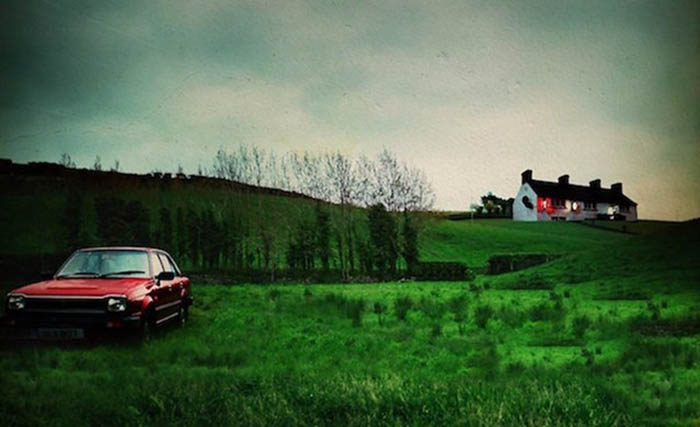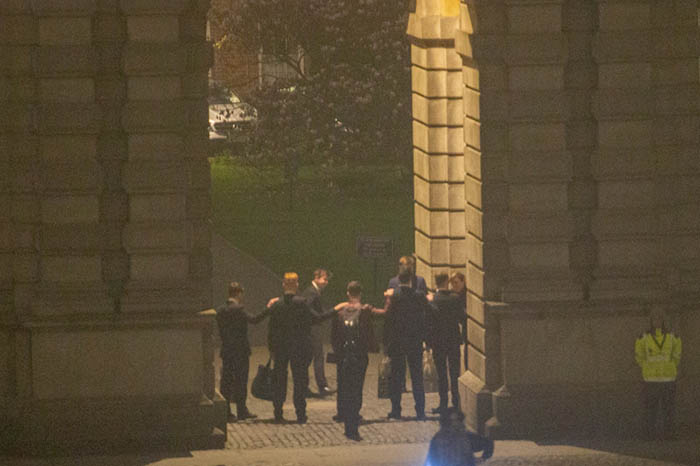17 Sep 2019 | Campaigns -- Featured, Northern Ireland, Statements
[vc_row][vc_column][vc_column_text]Index on Censorship condemns Ian Paisely MP’s attack on News Letter journalist Sam McBride and calls on parliamentarians to uphold and support the tenets of media freedom.
“Everyone has the right to disagree with a journalist’s analysis, but attacks on a journalist’s character and on their family are completely unacceptable”, said Jessica Ní Mhainín, policy research and advocacy officer at Index on Censorship. “Elected representatives like Mr Paisely, should know that such attacks can undermine media freedom, which is essential to our democracy.”
“We have filed an alert with the Council of Europe’s Platform to promote the protection of journalism. We call on all public representatives to support in the creation of a safe and enabling environment for journalists to work without fear of attacks, intimidation or interference.”[/vc_column_text][vc_basic_grid post_type=”post” max_items=”4″ element_width=”6″ grid_id=”vc_gid:1568729859706-eab009cf-e0c8-6″ taxonomies=”6534″][/vc_column][/vc_row]
29 May 2019 | Campaigns -- Featured, Media Freedom, media freedom featured, News and features, Northern Ireland, Press Releases, Statements, United Kingdom
[vc_row][vc_column][vc_column_text]
Update: Update: On 3 June 2019, the criminal investigation into Trevor Birney and Barry McCaffrey was dropped. The Durham Constabulary and the Police Service of Northern Ireland (PSNI) announced that they were no longer investigating the two journalists.
Update: On 31 May the High Court in Belfast ruled that journalists Trevor Birney and Barry McCaffrey acted lawfully, that police warrants against them were “inappropriate” and that all confiscated material be returned. Justice Morgan said that the material “does not indicate that the journalists acted in anything other than a perfectly proper manner”. “We consider that there’s no reason why, subject to suitable protections, for declining to return the material in their entirety to the journalists,” he added.
Index on Censorship and English PEN welcome the decision by the High Court in Northern Ireland to quash the warrants obtained by police to carry out raids on the homes and office of Belfast journalists Trevor Birney and Barry McCaffrey.
Birney and McCaffrey produced a documentary No Stone Unturned which examines claims of state collusion in the murders of six men.
In evidence submitted to the High Court in Northern Ireland, Index on Censorship and English PEN said the raid on the homes and office of Birney and McCaffrey should be ruled unlawful.
Index on Censorship and English PEN filed a written submission to the court on May 17 after the court granted permission for the organisations to intervene. Index on Censorship and English PEN are represented by solicitor Darragh Mackin at Phoenix Law and barrister Jude Bunting at Doughty Street Chambers.
Lord Chief Justice of Northern Ireland Sir Declan Morgan said: “We are minded to quash the warrants on the basis that they were inappropriate, whatever the other arguments.”
A further hearing is set for 2pm on Friday 31 May which will determine what remedy to grant following the success of the judicial review. The remedies could include: quashing the warrant; ordering the return to the journalists of the documents seized by police; damages.
Index on Censorship magazine editor Rachael Jolley said: “We welcome the news that the Lord Chief Justice is minded to quash the warrants against Trevor Birney and Barry McCaffrey. This is a significant step to ensure that press freedom is protected. English PEN and Index argued in a submission to the court that the conduct carried out in this case to raid the journalists’ houses and carry away documents and items that were not even related to the documentary was likely to have the effect of intimidating journalists throughout Northern Ireland and further afield.”
English PEN Director Antonia Byatt said: “We are very encouraged by this latest development in the case against Northern Irish journalists Trevor Birney and Barry McCaffrey, following our joint intervention in the case against them last week. We hope very much that Friday’s hearing will bring more good news. It is crucial that freedom of the press in the UK is protected, especially in the light of Jeremy Hunt’s current campaign for global media freedom.”
Mackin of Phoenix Law, said: “This is a victory for press freedom and common sense. The protection of journalistic material and sources is one of the basic conditions for freedom of expression. If journalists and their sources cannot rely on confidentiality, they may decide not to exchange information on sensitive matters of public interest for fear of the consequences. As a result, the vital “public watchdog” role of the press will be undermined and the ability of the press to provide accurate and reliable reporting may be adversely affected. This is why the approach of the police in this case was so obviously wrong. The decision to grant a warrant to obtain information from journalists, without giving them an opportunity to comment, had the purpose or effect of intimidating journalists the world over. The international significance of this claim is reflected in our client’s intervention.”
Index on Censorship is a London-based non-profit organisation that publishes work by censored writers and artists and campaigns against censorship worldwide. Since its founding in 1972, Index on Censorship has published some of the greatest names in literature in its award-winning quarterly magazine, including Samuel Beckett, Nadine Gordimer, Mario Vargas Llosa, Arthur Miller and Kurt Vonnegut. It also has published some of the world’s best campaigning writers from Vaclav Havel to Elif Shafak. Contact: [email protected].
English PEN is a registered charity and membership organisation which campaigns in the United Kingdom and around the world to protect the freedom to share information and ideas through writing.PEN supports authors and journalists in the United Kingdom and internationally who are prosecuted, persecuted, detained, or imprisoned for exercising the right to freedom of expression. English PEN has a strong record of campaigning for legal reform throughout the United Kingdom.[/vc_column_text][/vc_column][/vc_row][vc_row][vc_column][vc_basic_grid post_type=”post” max_items=”4″ element_width=”6″ grid_id=”vc_gid:1559659124565-535dd29e-e875-4″ taxonomies=”8996″][/vc_column][/vc_row]
22 May 2019 | News and features, Press Releases
[vc_row][vc_column][vc_row_inner][vc_column_inner width=”1/4″][/vc_column_inner][vc_column_inner width=”1/4″][vc_single_image image=”106984″ img_size=”full”][/vc_column_inner][vc_column_inner width=”1/4″][vc_single_image image=”106985″ img_size=”full”][/vc_column_inner][vc_column_inner width=”1/4″][/vc_column_inner][/vc_row_inner][vc_column_text]A raid on the homes and office of two Northern Irish investigative journalists should be ruled unlawful, freedom of expression groups Index on Censorship and English PEN have said in a submission to the High Court in Northern Ireland.
Index and English PEN have intervened in the case of Trevor Birney and Barry McCaffrey, who were arrested and questioned last year following armed raids on their homes over allegations a confidential document featured in their documentary No Stone Unturned, which examines claims of state collusion in the murders of six men had been stolen.
During the raid, police seized documents, personal computers and USB sticks belonging to family members and copied a computer server that contained years of sensitive reporting by the documentary makers, risking endangering confidential sources unrelated to the film.
Birney, McCaffrey and Fine Point Films will argue in a judicial review case to be heard in Belfast next week that the court should recognise that the search warrants used to carry out the raids were unlawful and improperly executed.
Index on Censorship and English PEN filed a written submission to the court on May 17 after the court granted permission for the organisations to intervene.
“The application for and execution of the search warrants was wholly disproportionate,” the submission states, noting the “chilling effect” of such orders. “That chilling effect is considerably more acute when the application is made ex parte [with respect to or in the interests of one side only or of an interested outside party], when authorities on the rights of journalists are not brought to the Court’s attention, and when the manner of the execution of the search warrants is so severe… such conduct is likely to have the effect of intimidating journalists throughout Northern Ireland and further afield.”
Index on Censorship and English PEN are represented by solicitor Darragh Mackin at Phoenix Law and barrister Jude Bunting at Doughty Street Chambers.
For more information please contact Sean Gallagher at Index on Censorship – [email protected] – or Cat Lucas at English PEN – [email protected].
Notes for editors
The judicial review will be held from 28 – 30 May.
English PEN is a registered charity and membership organisation which campaigns in the United Kingdom and around the world to protect the freedom to share information and ideas through writing.PEN supports authors and journalists in the United Kingdom and internationally who are prosecuted, persecuted, detained, or imprisoned for exercising the right to freedom of expression. English PEN has a strong record of campaigning for legal reform throughout the United Kingdom.
Index on Censorship is a London-based non-profit organisation that publishes work by censored writers and artists and campaigns against censorship worldwide. Since its founding in 1972, Index on Censorship has published some of the greatest names in literature in its award-winning quarterly magazine, including Samuel Beckett, Nadine Gordimer, Mario Vargas Llosa, Arthur Miller and Kurt Vonnegut. It also has published some of the world’s best campaigning writers from Vaclav Havel to Elif Shafak.[/vc_column_text][vc_basic_grid post_type=”post” max_items=”4″ element_width=”6″ grid_id=”vc_gid:1558600708500-33cfa04e-8965-8″ taxonomies=”8996″][/vc_column][/vc_row]
12 Apr 2019 | Academic Freedom, Campaigns, Media Freedom, media freedom featured, News and features
[vc_row][vc_column][vc_column_text]

Trinity College, Knights of the Campanile initiation ceremony. Credit: Eleanor O’Mahony, The University Times
The threat to the future of one of the two student newspapers at Dublin’s Trinity College has been averted following a referendum among students who voted against a proposition to defund the University Times.
The controversy, which was viewed as having implications for press freedom and freedom of speech at the university by bodies such as the National Union of Journalists, followed reporting of alleged hazing at an all-male and secretive sporting club, the Knights of the Campanile.
The story, reported last week by Index On Censorship, centred on the methods used to investigate the story. Those favouring punishing the newspaper claimed that listening in and using a recording device was an infringement of their privacy rights and suggested journalists would be randomly bugging student rooms.
Those favouring the newspaper and its staff said the story was in the public interest and that justified the journalists’ actions. Among those who supported the University Times included a former attorney general and minister for Justice, Michael McDowell. Support also came from the International Federation of Journalists and the NUJ’s Ethics Council, as well as a number of prominent Irish journalists.
The other university newspaper, Trinity News, accused the University Times of acting contrary to journalistic ethics and called for the resignation of the editor.
The vote was 788 voting to defund the newspaper and a massive 2271 against, which is 74 per cent in favour of the University Times.[/vc_column_text][/vc_column][/vc_row][vc_row][vc_column][vc_basic_grid post_type=”post” max_items=”4″ element_width=”6″ grid_id=”vc_gid:1555320232097-24dbceca-960a-5″ taxonomies=”8843″][/vc_column][/vc_row]


